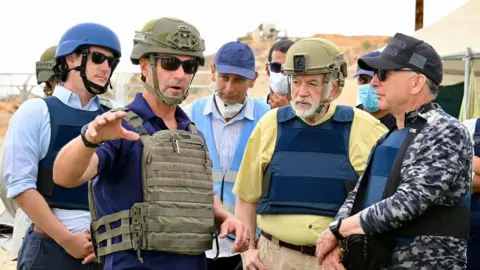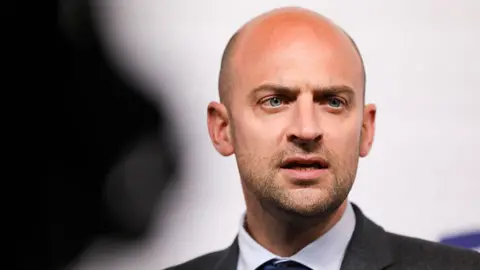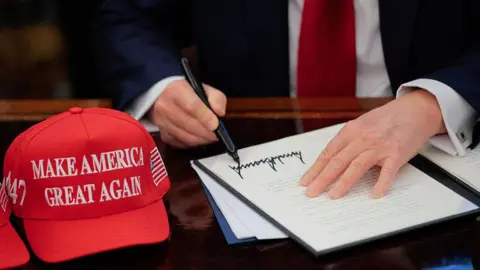Why Palestinians Doubt Starmer's Promise
**"Thank you, but it's too late."**
Imagine a global superpower offering a lifeline, a diplomatic game-changer, to a people yearning for sovereignty. Now, imagine that offer being met with a weary, almost heartbreaking, dismissal: "It's too late."
This isn't hyperbole. This is the stark reality faced by many Palestinians, even as Britain’s Labour leader, Sir Keir Starmer, champions a bold plan to recognize a **Palestinian state** at the UN General Assembly this September. International Editor Jeremy Bowen journeys into the heart of the **West Bank** to uncover why, for some, this pivotal diplomatic move feels like a ghost of a future long lost.
What truly lies beneath this profound skepticism? The answer is etched into the very landscape of the **occupied Palestinian territories**, a landscape forever altered by decades of concrete and controversy. Keep reading to understand the irreversible changes that threaten to bury the **two-state solution** for good, and why even significant international recognition might no longer be enough.
The Grand Promise vs. The Harsh Reality
For years, the **two-state solution** has been a diplomatic mantra, a whispered hope for peace in the **Middle East**. Yet, since the **Oslo peace process collapsed into bloodshed** a quarter-century ago, it has felt less like a viable path and more like an empty slogan. Now, Sir Keir Starmer, following in the footsteps of France and Canada, aims to breathe new life into it. His plan for **UK recognition of a Palestinian state** isn't just symbolic; it's designed to transform the two-state ideal into a tangible diplomatic blueprint once more.
But a single day traversing the rugged hills and fertile valleys of the **West Bank** offers a chilling counter-narrative. Here, the ambitious vision of two states often collides with the undeniable, towering facts on the ground.
 Concrete Facts, Stolen Dreams: The Israeli Settlement Project
Days after the 1967 Middle East War, Israel began a colossal national project: building settlements on captured land. What started as small outposts has mushroomed into sprawling, well-established towns. Today, these **Jewish settlements** are home to over 700,000 Israelis, their red-roofed houses sprawling across hilltops, effectively dissecting the very land Palestinians envision for their state.
This audacious project, nearly 60 years in the making and costing billions of dollars, has drawn not just condemnation from foes, but also sharp rebukes from allies. Why? Because under **international law**, it is explicitly forbidden for an occupying power to settle its citizens on captured territory. Last year, the International Court of Justice delivered an advisory opinion, declaring the entire **Israeli occupation** itself illegal.
Despite this global consensus, Prime Minister Benjamin Netanyahu’s government hungers for more. Their ambition, it seems, knows no bounds.
A Blueprint for Annexation: "Next Step Sovereignty!"
Just weeks ago, a seismic announcement rocked the region. Defence Minister Israel Katz and Finance Minister Bezalel Smotrich unveiled plans for **22 new settlements** in the **West Bank** – the largest expansion in decades.
Katz declared this a "strategic move that prevents the establishment of a Palestinian state that would endanger Israel and serves as a buffer against our enemies." He called it a "Zionist, security, and national response – and a clear decision on the future of the country."
Concrete Facts, Stolen Dreams: The Israeli Settlement Project
Days after the 1967 Middle East War, Israel began a colossal national project: building settlements on captured land. What started as small outposts has mushroomed into sprawling, well-established towns. Today, these **Jewish settlements** are home to over 700,000 Israelis, their red-roofed houses sprawling across hilltops, effectively dissecting the very land Palestinians envision for their state.
This audacious project, nearly 60 years in the making and costing billions of dollars, has drawn not just condemnation from foes, but also sharp rebukes from allies. Why? Because under **international law**, it is explicitly forbidden for an occupying power to settle its citizens on captured territory. Last year, the International Court of Justice delivered an advisory opinion, declaring the entire **Israeli occupation** itself illegal.
Despite this global consensus, Prime Minister Benjamin Netanyahu’s government hungers for more. Their ambition, it seems, knows no bounds.
A Blueprint for Annexation: "Next Step Sovereignty!"
Just weeks ago, a seismic announcement rocked the region. Defence Minister Israel Katz and Finance Minister Bezalel Smotrich unveiled plans for **22 new settlements** in the **West Bank** – the largest expansion in decades.
Katz declared this a "strategic move that prevents the establishment of a Palestinian state that would endanger Israel and serves as a buffer against our enemies." He called it a "Zionist, security, and national response – and a clear decision on the future of the country."
 Standing beside him, the ultra-nationalist Bezalel Smotrich, who himself lives in a West Bank settlement and believes the land was divinely given to Jews, echoed the sentiment with even greater fervor. As Finance Minister, Smotrich wields immense power, effectively acting as the governor of the West Bank with sweeping authority over planning. He hailed the expansion as a "once-in-a-generation decision," adding a chilling declaration: **"Next step sovereignty!"**
In Israel, and among Palestinians in the territories, everyone understands what Smotrich and his allies mean by "sovereignty": outright **annexation**. Smotrich makes no secret of his desire for all the land to be Jewish, openly discussing ways to remove Palestinians. This isn't just rhetoric; it's a blueprint for the future.
But what does this mean for the everyday lives of Palestinians caught in the crossfire?
Life Under Threat: A Village on the Edge
The **West Bank** landscape is a tapestry of development, from mature, tree-lined towns to raw outposts. These smaller outposts, often populated by young, militant settlers, frequently mix extreme Jewish nationalism, firearms, and sometimes deadly aggression towards their Palestinian neighbors. Disturbingly, UN statistics and peace campaigners show a sharp increase in **settler violence** against Palestinians since the October 7th attacks.
I visited Taybeh, a quiet, entirely Christian village of 1,500 souls, to witness this impact firsthand. It’s a place that seems to hold more houses than residents; decades of **Israeli occupation** have forced more people to emigrate than now live there.
Just two nights before my visit, settlers stormed the village under the cover of darkness. They torched Kamal Tayea’s car and tried to breach his new home, a pleasant property overlooking ancient olive groves. The walls were defaced with Hebrew graffiti, sprayed in angry red paint.
Standing beside him, the ultra-nationalist Bezalel Smotrich, who himself lives in a West Bank settlement and believes the land was divinely given to Jews, echoed the sentiment with even greater fervor. As Finance Minister, Smotrich wields immense power, effectively acting as the governor of the West Bank with sweeping authority over planning. He hailed the expansion as a "once-in-a-generation decision," adding a chilling declaration: **"Next step sovereignty!"**
In Israel, and among Palestinians in the territories, everyone understands what Smotrich and his allies mean by "sovereignty": outright **annexation**. Smotrich makes no secret of his desire for all the land to be Jewish, openly discussing ways to remove Palestinians. This isn't just rhetoric; it's a blueprint for the future.
But what does this mean for the everyday lives of Palestinians caught in the crossfire?
Life Under Threat: A Village on the Edge
The **West Bank** landscape is a tapestry of development, from mature, tree-lined towns to raw outposts. These smaller outposts, often populated by young, militant settlers, frequently mix extreme Jewish nationalism, firearms, and sometimes deadly aggression towards their Palestinian neighbors. Disturbingly, UN statistics and peace campaigners show a sharp increase in **settler violence** against Palestinians since the October 7th attacks.
I visited Taybeh, a quiet, entirely Christian village of 1,500 souls, to witness this impact firsthand. It’s a place that seems to hold more houses than residents; decades of **Israeli occupation** have forced more people to emigrate than now live there.
Just two nights before my visit, settlers stormed the village under the cover of darkness. They torched Kamal Tayea’s car and tried to breach his new home, a pleasant property overlooking ancient olive groves. The walls were defaced with Hebrew graffiti, sprayed in angry red paint.
 Kamal, a middle-aged man now reconsidering his family’s move to the village edge, is hastily installing security cameras. "We were very, very scared," he recounted, his voice tight with remembered fear. "I have children and an old mum. Our lives were threatened, and it was terrifying."
I asked Kamal if Britain's plan for **Palestinian state recognition** offered any hope, any solace. His response was a resigned sigh. "I don't think so. It's a big step to have a superpower like Britain support us, but on the ground, it does not change much. Israel is not compliant with any international resolutions or laws. It does not listen to any other country in the whole world."
His words hang heavy in the air, a stark reminder of the chasm between diplomatic intention and lived reality.
Unyielding Roots: The Spirit of Resistance
The attacks didn’t stop at Taybeh. The very next night, Jewish settlers raided neighboring Palestinian communities, burning more cars and spraying more graffiti. This isn't mere vandalism; it's a calculated strategy. The settlers want the Palestinians out, and in some areas, they have succeeded, forcing remote villagers off their farms and stealing their livestock.
I met Father David Khoury, a 74-year-old Greek Orthodox priest, born and raised in Taybeh. In his ancient church, he told me that the settlers who threaten him and his community are often armed. "Yes, they have guns… they'll use them if we argue with them. They want us out, they want us to leave."
But the old priest was defiant, his voice ringing with a deep-seated conviction. "We are here, since Jesus Christ, 2,000 years. Our roots are here. We can't move. We will not move, even if we die here, we will not move from here… Palestine is inside our blood, how we can live without our blood?" His words are a powerful testament to the unwavering **Palestinian identity** and a refusal to be dislodged from their ancestral lands.
Kamal, a middle-aged man now reconsidering his family’s move to the village edge, is hastily installing security cameras. "We were very, very scared," he recounted, his voice tight with remembered fear. "I have children and an old mum. Our lives were threatened, and it was terrifying."
I asked Kamal if Britain's plan for **Palestinian state recognition** offered any hope, any solace. His response was a resigned sigh. "I don't think so. It's a big step to have a superpower like Britain support us, but on the ground, it does not change much. Israel is not compliant with any international resolutions or laws. It does not listen to any other country in the whole world."
His words hang heavy in the air, a stark reminder of the chasm between diplomatic intention and lived reality.
Unyielding Roots: The Spirit of Resistance
The attacks didn’t stop at Taybeh. The very next night, Jewish settlers raided neighboring Palestinian communities, burning more cars and spraying more graffiti. This isn't mere vandalism; it's a calculated strategy. The settlers want the Palestinians out, and in some areas, they have succeeded, forcing remote villagers off their farms and stealing their livestock.
I met Father David Khoury, a 74-year-old Greek Orthodox priest, born and raised in Taybeh. In his ancient church, he told me that the settlers who threaten him and his community are often armed. "Yes, they have guns… they'll use them if we argue with them. They want us out, they want us to leave."
But the old priest was defiant, his voice ringing with a deep-seated conviction. "We are here, since Jesus Christ, 2,000 years. Our roots are here. We can't move. We will not move, even if we die here, we will not move from here… Palestine is inside our blood, how we can live without our blood?" His words are a powerful testament to the unwavering **Palestinian identity** and a refusal to be dislodged from their ancestral lands.
 A Glimmer of Hope? The Diplomatic View
A few miles away, in Ramallah, the de facto Palestinian capital, a very different sentiment prevails. While Israeli checkpoints made a physical visit difficult, I connected with Husam Zomlot via Zoom. He is the head of the Palestinian delegation to the United Kingdom, effectively their ambassador in London. Back home for the summer, Zomlot was positively jubilant about Britain's recognition plan.
"It is a sign that the UK and with it, the rest of the international community are really serious about the **two-state solution**," he declared, radiating optimism. "We are no longer in the business of the lip service that has lost us three decades. Actually, if you really seek two states, recognize the two states."
Zomlot sees the recognition as "the starting gun to a sprint towards implementing and establishing the state of Palestine and fulfilling the legitimate rights of the Palestinian people." For him, Britain's decision is not just a first step, but a genuinely transformative one. He even suggested Britain was finally atoning for the wrongs committed against Palestinians during its imperial rule between 1917 and 1948.
He pointed to a brief, typewritten letter from November 2, 1917, signed by Foreign Secretary Arthur Balfour and addressed to Lord Rothschild. This infamous **Balfour Declaration** declared Britain would "view with favour the establishment in Palestine of a national home for the Jewish people." But it also contained another promise: "Nothing shall be done which may prejudice the civil and religious rights of existing non-Jewish communities in Palestine." These "non-Jewish communities," the majority Palestinian Arabs, were left unnamed – a slight that, 108 years later, still rankles Zomlot.
Echoes of Empire: Britain's Burden and Israel's Stance
This week at the UN in New York, Britain's Foreign Secretary David Lammy acknowledged this complex history. He stated the UK could be proud of its role in laying Israel's foundations after 1917, but admitted that breaking the promise to Palestinians in the Balfour Declaration had caused "a historical injustice which continues to unfold."
A Glimmer of Hope? The Diplomatic View
A few miles away, in Ramallah, the de facto Palestinian capital, a very different sentiment prevails. While Israeli checkpoints made a physical visit difficult, I connected with Husam Zomlot via Zoom. He is the head of the Palestinian delegation to the United Kingdom, effectively their ambassador in London. Back home for the summer, Zomlot was positively jubilant about Britain's recognition plan.
"It is a sign that the UK and with it, the rest of the international community are really serious about the **two-state solution**," he declared, radiating optimism. "We are no longer in the business of the lip service that has lost us three decades. Actually, if you really seek two states, recognize the two states."
Zomlot sees the recognition as "the starting gun to a sprint towards implementing and establishing the state of Palestine and fulfilling the legitimate rights of the Palestinian people." For him, Britain's decision is not just a first step, but a genuinely transformative one. He even suggested Britain was finally atoning for the wrongs committed against Palestinians during its imperial rule between 1917 and 1948.
He pointed to a brief, typewritten letter from November 2, 1917, signed by Foreign Secretary Arthur Balfour and addressed to Lord Rothschild. This infamous **Balfour Declaration** declared Britain would "view with favour the establishment in Palestine of a national home for the Jewish people." But it also contained another promise: "Nothing shall be done which may prejudice the civil and religious rights of existing non-Jewish communities in Palestine." These "non-Jewish communities," the majority Palestinian Arabs, were left unnamed – a slight that, 108 years later, still rankles Zomlot.
Echoes of Empire: Britain's Burden and Israel's Stance
This week at the UN in New York, Britain's Foreign Secretary David Lammy acknowledged this complex history. He stated the UK could be proud of its role in laying Israel's foundations after 1917, but admitted that breaking the promise to Palestinians in the Balfour Declaration had caused "a historical injustice which continues to unfold."
 Back in Jerusalem, at Israel’s parliament, the Knesset, Simcha Rothman, an ultra-nationalist MP from the National Religious party, also had Britain's imperial past on his mind. He scoffed at the idea of Britain playing the "imperial power" again, reminding everyone of the British and French attempts to fix borders after carving up the Middle East from the dying Ottoman Empire during WWI.
Like Benjamin Netanyahu and Bezalel Smotrich, Rothman vehemently rejected Starmer's plan, arguing it would reward Hamas terrorism. He dismissed Starmer's offer to postpone recognition if Israel agreed to a full **Gaza ceasefire** and a revival of the two-state solution. "He is threatening the state of Israel with punishment and thinks that’s the way to bring peace to the Middle East," Rothman fumed. "He is not in a position to punish us, and it definitely will not bring peace."
He concluded with a provocative jab, "And it's against justice, history, religion, culture... he's giving a huge reward for Yahya Sinwar [the Hamas leader who led the 7 October attacks and was killed by Israeli forces in Gaza last year]. Wherever he is in hell today, he sees what Keir Starmer says - and says, 'good partner.'"
The Bitter Truth: "Too Late" Rings Out
Back in Taybeh, as I sipped coffee with the mayor and a group of leading local citizens, I posed the same question: what do they think of the UK’s recognition plan?
One local businessman summed up the prevailing sentiment, echoing Kamal Tayea’s earlier words, laden with both gratitude and a profound sense of despair: **"Thank you Britain. But it's too late."**
This simple phrase captures the agonizing dilemma at the heart of the **Israeli-Palestinian conflict**: Can diplomatic gestures, no matter how well-intentioned, truly reverse decades of entrenched facts on the ground? For many Palestinians, the answer, tragically, seems to be no. The recognition they've longed for may have arrived, but the land for their state has already slipped away, piece by concrete piece.
Back in Jerusalem, at Israel’s parliament, the Knesset, Simcha Rothman, an ultra-nationalist MP from the National Religious party, also had Britain's imperial past on his mind. He scoffed at the idea of Britain playing the "imperial power" again, reminding everyone of the British and French attempts to fix borders after carving up the Middle East from the dying Ottoman Empire during WWI.
Like Benjamin Netanyahu and Bezalel Smotrich, Rothman vehemently rejected Starmer's plan, arguing it would reward Hamas terrorism. He dismissed Starmer's offer to postpone recognition if Israel agreed to a full **Gaza ceasefire** and a revival of the two-state solution. "He is threatening the state of Israel with punishment and thinks that’s the way to bring peace to the Middle East," Rothman fumed. "He is not in a position to punish us, and it definitely will not bring peace."
He concluded with a provocative jab, "And it's against justice, history, religion, culture... he's giving a huge reward for Yahya Sinwar [the Hamas leader who led the 7 October attacks and was killed by Israeli forces in Gaza last year]. Wherever he is in hell today, he sees what Keir Starmer says - and says, 'good partner.'"
The Bitter Truth: "Too Late" Rings Out
Back in Taybeh, as I sipped coffee with the mayor and a group of leading local citizens, I posed the same question: what do they think of the UK’s recognition plan?
One local businessman summed up the prevailing sentiment, echoing Kamal Tayea’s earlier words, laden with both gratitude and a profound sense of despair: **"Thank you Britain. But it's too late."**
This simple phrase captures the agonizing dilemma at the heart of the **Israeli-Palestinian conflict**: Can diplomatic gestures, no matter how well-intentioned, truly reverse decades of entrenched facts on the ground? For many Palestinians, the answer, tragically, seems to be no. The recognition they've longed for may have arrived, but the land for their state has already slipped away, piece by concrete piece.


Image 1

Image 2

Image 3

Image 4

Image 5

Image 6
Comments
Post a Comment